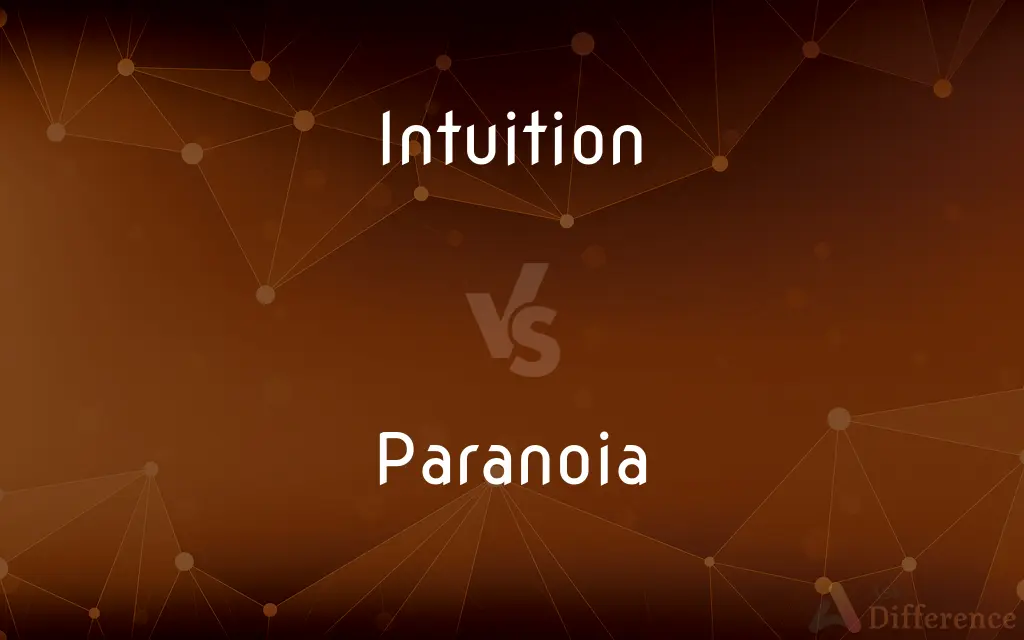Intuition vs. Paranoia — What's the Difference?

Difference Between Intuition and Paranoia
ADVERTISEMENT
Compare with Definitions
Intuition
Intuition is the ability to acquire knowledge without recourse to conscious reasoning. Different fields use the word "intuition" in very different ways, including but not limited to: direct access to unconscious knowledge; unconscious cognition; inner sensing; inner insight to unconscious pattern-recognition; and the ability to understand something instinctively, without any need for conscious reasoning.The word intuition comes from the Latin verb intueri translated as "consider" or from the late middle English word intuit, "to contemplate".
Paranoia
Paranoia is an instinct or thought process which is believed to be heavily influenced by anxiety or fear, often to the point of delusion and irrationality. Paranoid thinking typically includes persecutory beliefs, or beliefs of conspiracy concerning a perceived threat towards oneself (i.e.
Intuition
The ability to understand something instinctively, without the need for conscious reasoning
We shall allow our intuition to guide us
Paranoia
Irrational distrust or suspicion of others, especially as occurring in people with psychiatric disorders such as paranoid personality disorder and schizophrenia
Paranoia about neighbors stealing from his vegetable garden.
Intuition
The faculty of knowing or understanding something without reasoning or proof.
ADVERTISEMENT
Paranoia
Intense anxiety or worry
Paranoia about losing her job.
Intuition
An impression or insight gained by the use of this faculty
"I had this intuition you would come here just after the rain broke" (Carson McCullers).
Paranoia
The obsolete name for a psychotic disorder, now called delusional disorder, often (in one of 6 subtypes) characterized by delusions of persecution and perceived threat against the individual affected with the disorder, and often associated with false accusations and general mistrust of others
Intuition
Immediate cognition without the use of conscious rational processes.
Paranoia
Extreme, irrational distrust of others.
Intuition
A perceptive insight gained by the use of this faculty.
Paranoia
A chronic form of insanity characterized by very gradual impairment of the intellect, systematized delusion, and usually by delusions of persecution or mandatory delusions producing homicidal tendency. In its mild form paranoia may consist in the well-marked crotchetiness exhibited in persons commonly called "cranks." Paranoiacs usually show evidences of bodily and nervous degeneration, and many have hallucinations, esp. of sight and hearing.
Intuition
A looking after; a regard to.
What, no reflection on a reward! He might have an intuition at it, as the encouragement, though not the cause, of his pains.
Paranoia
Unwarranted suspicion of the motives of others; - used colloquially in a non-technical sense.
Intuition
Direct apprehension or cognition; immediate knowledge, as in perception or consciousness; - distinguished from "mediate" knowledge, as in reasoning; as, the mind knows by intuition that black is not white, that a circle is not a square, that three are more than two, etc.; quick or ready insight or apprehension.
Sagacity and a nameless something more, - let us call it intuition.
Paranoia
A psychological disorder characterized by delusions of persecution or grandeur
Intuition
Any object or truth discerned by intuition.
Intuition
Any quick insight, recognized immediately without a reasoning process; a belief arrived at unconsciously; - often it is based on extensive experience of a subject.
Intuition
The ability to have insight into a matter without conscious thought; as, his chemical intuition allowed him to predict compound conformations without any conscious calculation; a mother's intuition often tells her what is best for her child.
Intuition
Instinctive knowing (without the use of rational processes)
Intuition
An impression that something might be the case;
He had an intuition that something had gone wrong
Share Your Discovery

Previous Comparison
Bacteria vs. Protozoa
Next Comparison
Measles vs. Chickenpox













































